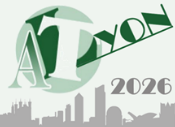 |
ALT-2026 : 16th International Conference of the Association for Linguistic Typology1-3 July 2026 Lyon (France) |
|
|
|
WorkshopsWorkshops (listed alphabetically by title)WS1. Associated postureConvenors: Antoine Guillaume (CNRS, Lyon, France) and Albert Alvarez Gonzalez (Universidad de Sonora, Mexico)Associated Posture (AP) is a newly identified comparative concept referring to grammatical morphemes—such as affixes, clitics, particles, or auxiliaries—that are associated with the verb and can express postural meanings in temporal relation to the verb event (e.g., ‘V while sitting/standing/lying…’, ‘V and then sit/stand/lie…’, ‘sit/stand/lie and then V’, ‘V while a non-subject is sitting/standing/lying’, etc.). Although identified so far primarily in languages of Central and South America, Associated Posture (AP) expressions appear to be attested in languages from all over the world. The goal of this workshop is to bring the AP phenomenon to the wider attention of typologists, stimulate new descriptive and comparative research on AP in different parts of the world, initiate new collaborations between language specialists working on AP, and work towards a common understanding of the phenomenon. WS2. Diversity in systemic expansion and contractionConvenors: Oliver Bond (University of Surrey, UK) and Dávid Győrfi (University of Surrey, UK)Grammatical systems, such as case, gender, and TAM, can differ dramatically even among closely related languages, sometimes expanding to cross-linguistically unusual proportions or contracting to just a few core distinctions. This workshop explores the underlying parameters that drive large-scale systemic expansion and contraction. While much research has focused on the grammaticalization of individual constructions, less is known about how new and existing categories interact in the most expansive systems, or what motivates their growth or reduction. The workshop aims to explore how expansive systems inform our understanding of linguistic organization and change. WS3. Incorporating the spoken signal into grammatical typologyConvenors: Laura Becker (University of Freiburg, Germany) and Naomi Peck (University of Freiburg, Germany)Most languages are primarily spoken, with only a minority of languages or speaker communities developing a writing system. Despite the primacy of the spoken mode for language, most work on grammar has relied upon the study of written representations, with typology being no exception. In this workshop, our aim is to bring together typologists who explore how the unique properties associated with the spoken signal are related to grammatical structures across languages. Our objective is to gain a better understanding of how phonetic and prosodic properties interact with other levels of grammatical structures, how they can affect language change and grammaticalization, and what methods we have to study the effect of the spoken signal on grammar from a typological perspective. WS4. Parametrization of tonal systemsConvenors: Valentin Vydrin (CNRS, Paris, France), Dmitry Gerasimov (INALCO, Paris, France), and Kirill Maslinsky (INALCO, Paris, France)The aim of this workshop is to stimulate discussion on quantifiable parameters of tonal systems which could serve as a basis for generalizations about variability of tone. The following questions will be discussed: What varies and within what limits, what is typical and what is not? Which parameters of variation of tonal systems are of theoretical interest to typology? What phenomena are expected to be more frequent, correlated, or at all extant, and why? WS5. Quantitative typology — new directions in assembling and analyzing cross-linguistic dataConvenors: Anikka Tjuka (Max Planck Institute for Evolutionary Anthropology, Leipzig, Germany), Christian Bentz (University of Passau, Germany), and Johann-Mattis List (University of Passau, Germany)We invite researchers to contribute to our workshop on quantitative typology, which explores new directions in assembling and analysing cross-linguistic data. With the advent of large typological databases and online resources, researchers now have access to vast amounts of linguistic data. This allows researchers to ask novel research questions and study language variation on a large scale. By using computational approaches, researchers can aggregate data from different sources and investigate complex phenomena such as semantic change, variation across semantic domains and language complexity across typologically diverse languages. Our workshop focuses on two key aspects: increased data availability and new research questions. We encourage submissions that demonstrate innovative techniques for data aggregation, use quantitative analyses to answer complex research questions, and highlight advances in data standardization and collaborative efforts. WS6. Semantic shifts and the dynamics of lexification patternsConvenors: Alexandre François (CNRS, Paris, France), Anna Zalizniak (Institute of Linguistics, Moscow, Russia), and Anna Smirnitskaya (Hebrew University of Jerusalem, Israel)While fundamental principles of semantic change in the lexicon are generally well understood, we still need to better figure out their typological tendencies. Paths of change are evidently not totally random, because many instances of change A→B are recurrent across families; but are all these paths universally attested? Or are certain semantic shifts more frequent in certain families or areas? Online etymological resources, such as DatSemShift and EvoSem, provide empirical data that can help compare tendencies around the world. In addition, progress can be made in analysing the dynamics of (co-/dis-) lexification patterns, in modelling semantic shifts, or in visually representing change. These are some of the questions that will be addressed in this workshop. |

